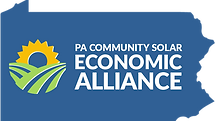Pa. lawmaker launches new attempt to allow community solar
Rachel McDevitt APRIL 10, 2023
Lawmakers are trying to give people more options when it comes to buying solar energy.
Pennsylvania law allows for small, rooftop solar projects and large, utility-scale projects–but not for those that fall in-between.
State Sen. Rosemary Brown (R-Monroe) is sponsoring a measure to lift a ban on community solar projects.
“This gives the ability for households or renters to have that option to utilize solar and get some financial benefits from it as well,” Brown said.
Related Stories
- Community solar proposal getting bipartisan support in legislature
- Solar companies are eyeing Pa. farmland. A legislative agency is looking at ways communities can prepare
Community solar increases access for people who can’t install their own panels, either because of cost, a shaded roof, or living in a rental. They let people subscribe directly to an offsite solar project and get credit on their electricity bill for the extra power produced by the panels.
Similar bills have had bipartisan support over the years, but have never made it to the governor’s desk.
In previous debates, lawmakers have expressed concern that community solar customers would cost utility companies and threaten grid maintenance.
PJM coordinates electricity in 13 states and the District of Columbia. Five of those states and D.C. already mandate or incentivize community solar.
Around 95% of new power projects proposed in the PJM region are wind and solar. PJM says 200,000 megawatts of renewable power could connect to the grid in the next four years if built by developers.
PPL, the electric utility for parts of central and northeastern Pennsylvania, did not return a request for comment for this story.
Brown said the time could be right for the legislation now, because of recent discussions in the legislature about energy reliability and affordability.
She said she thinks the benefits outweigh any potential risk; community solar can help lower electricity bills, diversify the state’s energy sources, and be good for the environment.
“The reality of everything coming together makes a lot of sense here, that this is a good time to offer this opportunity that may not be available to people traditionally,” Brown said.
She also noted the economic benefits. A 2020 Penn State study of more than 200 planned projects found that construction would create 5,991 direct jobs. Once in operation, the study said the projects would generate around $83.3 million in economic output.






